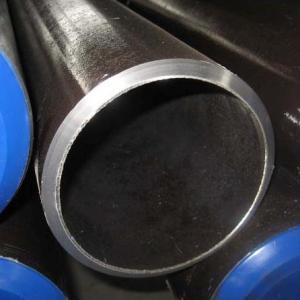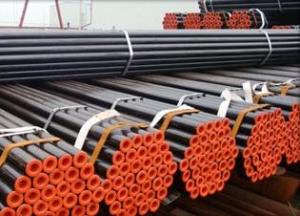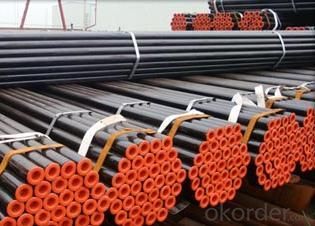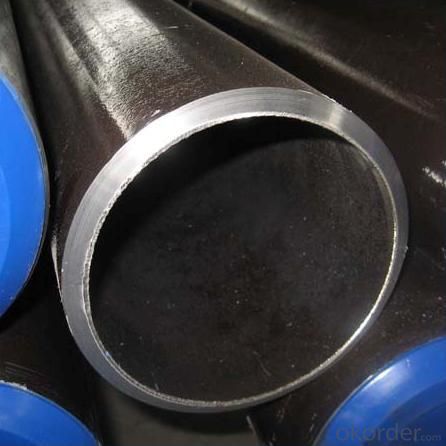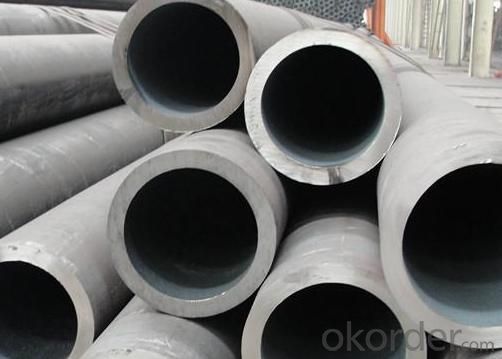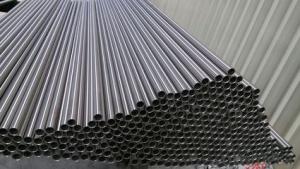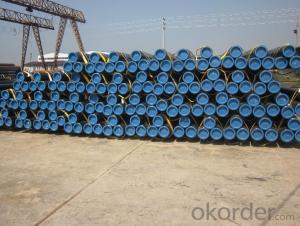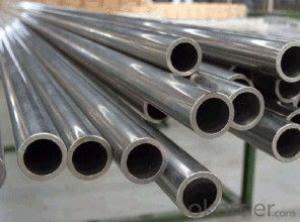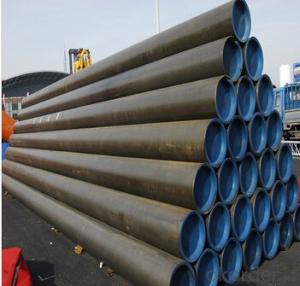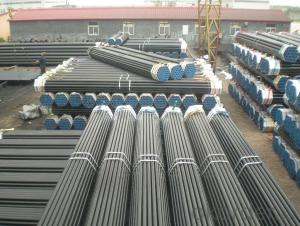High Quality Seamless Steel Tubes For Hydraulic Pillar Service
- Loading Port:
- China Main Port
- Payment Terms:
- TT or LC
- Min Order Qty:
- 20M.T. m.t.
- Supply Capability:
- 5000 Tons Per Month m.t./month
OKorder Service Pledge
OKorder Financial Service
You Might Also Like
Specifications of High Quality Seamless Steel Tubes for Hydraulic Pillar Service
Standard:
1.Carbon steel pipe: ASTM A106,A53, ASTM A179, ASTM A192,DIN17175 ST45.8 ST35.8
2.Alloy steel pipe: ASTM A335,ASTM A213
3.Stainless steel pipe: ASTM A312,ASTM A213
4.Line pipe and cashing pipe: API5L ,API 5CT
Out Diameter:
1/8 – 30 inch (10.3-762mm)
Wall Thickness:
0.049” – 2.5” (1.24- 63.5mm)
Length:
Random Length, Fixed Length, SRL, DRL
Steel Grade:
API 5L: GR B, X42, X46, X56, X60, X65, X70
ASTM A53/A106: GR A, GR B, GR C
ASME SA106: GR.A, GR.B, GR.C
ASME SA192: SA192
ASME SA209M: T1, T1a
ASME SA210: GR.A-1, GR.C
ASME SA213: T2, T5, T9, T11, T12, T22
ASME SA335: P2, P5, P9, P11, P12, P22, P91
DIN17175:ST35.8, ST45.8, 15Mo3, 13CrMo44
Usage/Application of High Quality Seamless Steel Tubes for Hydraulic Pillar Service
Applicable to the general structure, mechanical structure, Low, medium and high pressure boiler,
transportation for gas, water, oil and natural gas, tubes for heat exchanger and chemical fertilizer
equipments, for hydraul hydraulic pillar service etc..
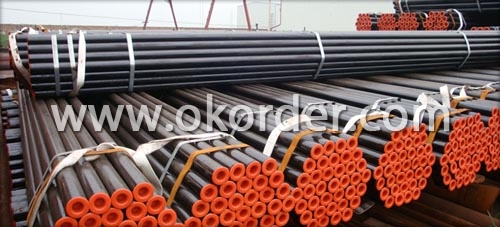
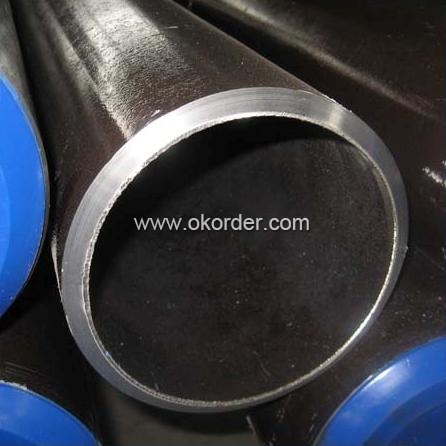
- Q: How are steel pipes used in the manufacturing of shipbuilding and offshore structures?
- Steel pipes are essential components in the manufacturing of shipbuilding and offshore structures. They are widely used due to their strength, durability, and resistance to corrosion, making them ideal for the harsh marine environment. In shipbuilding, steel pipes are used for various purposes. One of the main applications is in the construction of the hull, the framework that provides structural support to the ship. Steel pipes are used to form the keel and the frames, which help to maintain the shape and strength of the hull. These pipes are welded together to create a robust and rigid structure that can withstand the forces exerted on the ship during navigation. Moreover, steel pipes are used in the construction of various systems onboard the ship. For instance, they are utilized in the piping system for transporting fluids like fuel, water, and oil throughout the vessel. Steel pipes are also employed in the ventilation and air conditioning systems, ensuring proper airflow and temperature control within the ship. In offshore structures, such as oil rigs and platforms, steel pipes play a crucial role. These structures are typically subjected to extreme environmental conditions, including severe weather, high pressure, and corrosive saltwater. Steel pipes are used to fabricate the legs, risers, and other load-bearing components of offshore structures. These pipes provide the necessary strength and stability, allowing the structure to withstand the forces exerted by waves, wind, and drilling operations. Additionally, steel pipes are utilized in the construction of subsea pipelines. These pipelines are used to transport oil, gas, and other fluids from offshore drilling sites to onshore facilities. Steel pipes are preferred due to their high tensile strength and ability to withstand the high pressure and corrosive conditions found in subsea environments. Overall, steel pipes are indispensable in the manufacturing of shipbuilding and offshore structures. Their exceptional strength, durability, and corrosion resistance make them the preferred choice for constructing hulls, systems, and load-bearing components. Without steel pipes, the construction of ships and offshore structures would be significantly compromised in terms of safety, reliability, and longevity.
- Q: Can steel pipes be used for underground sewerage systems?
- Yes, steel pipes can be used for underground sewerage systems. Steel pipes are strong and durable, making them suitable for carrying sewage underground. They have a high resistance to corrosion and can withstand the pressure and load of the ground above. Steel pipes also have a long lifespan and are resistant to environmental factors such as moisture, chemicals, and temperature fluctuations. Additionally, steel pipes can be easily welded, making installation and repairs more convenient. However, it is important to ensure that the steel pipes are properly coated or lined to prevent corrosion and to comply with local regulations and standards for underground sewerage systems.
- Q: What are the different shapes available for steel pipes?
- There are several different shapes available for steel pipes, including round, square, rectangular, and oval.
- Q: How do steel pipes handle extreme weather conditions?
- Steel pipes are highly durable and can withstand extreme weather conditions. They have excellent resistance to corrosion, which allows them to maintain their structural integrity even in harsh environments. Additionally, steel pipes have high tensile strength, making them resistant to bending, cracking, or collapsing under extreme weather events such as strong winds, heavy snow, or intense heat. Overall, steel pipes are a reliable choice for handling extreme weather conditions.
- Q: How can two smooth steel pipes be joined? The size of the two pipe is different (except for welding)
- Fastener type steel pipe scaffold, fastener is the connection between steel pipe and steel pipe, and its form has three kinds, namely right angle fastener, rotating fastener, butt fastener
- Q: Can steel pipes be used for underground sprinkler systems?
- Yes, steel pipes can be used for underground sprinkler systems. Steel pipes are known for their durability and strength, making them a suitable choice for underground applications. They are resistant to corrosion and can withstand high pressure and temperature, making them suitable for delivering water to sprinkler heads. However, it is important to note that steel pipes may require additional coatings or protective measures to prevent rusting and corrosion over time. Additionally, steel pipes may be more expensive than other materials such as PVC or polyethylene, so the cost factor should be considered as well. Overall, steel pipes can be a viable option for underground sprinkler systems, particularly in areas with harsher environmental conditions.
- Q: What are the different sizes available for steel pipes?
- Steel pipes are available in a wide range of sizes, ranging from small diameters as small as 1/8 inch to larger diameters exceeding 72 inches. The sizes of steel pipes are typically measured based on their outside diameter (OD) and wall thickness, with various standard sizes available to meet different application requirements.
- Q: Can galvanized pipe be welded with seamless steel tube? What should I do to connect?
- See the galvanized pipe and seamless steel pipe steel that differences in how if the difference is too large then the steel used for two kinds of materials for welding requirements is not the same, do not recommend direct welding, low pressure can be used in high voltage wire, welding on both sides of the same material flange with flange connection.
- Q: Can steel pipes be used for the construction of dams?
- Yes, steel pipes can be used for the construction of dams. Steel pipes are often used in dam construction for various purposes such as water intake and outlet structures, penstocks, and spillway gates. They offer durability, strength, and resistance to corrosion, making them suitable for withstanding the high pressures and harsh environments associated with dam construction.
- Q: What is the impact resistance of steel pipes?
- Steel pipes have a high level of impact resistance thanks to the natural properties of steel. Steel, known for its strength and durability, can endure substantial external forces and impacts without deforming or breaking. The impact resistance of steel pipes is further improved by their construction and design. Various manufacturing techniques, such as seamless or welded construction, are used to create steel pipes, ensuring uniformity and strength throughout the structure. This construction process eliminates weak points or seams that could compromise the pipe's impact resistance. Additionally, steel pipes can be customized to meet specific impact resistance requirements based on their intended use. Different grades and types of steel can be utilized to achieve varying levels of impact resistance, allowing for customization to suit different industries and environments. The excellent impact resistance of steel pipes is particularly advantageous in industries such as construction, oil and gas, and transportation. These industries subject pipes to heavy loads, pressure, and potential impacts. Steel pipes can withstand these harsh conditions, making them a dependable choice for a wide range of applications. To summarize, steel pipes have outstanding impact resistance due to the inherent strength and durability of steel, as well as the construction techniques employed during manufacturing. Steel pipes can withstand significant external forces and impacts, making them a reliable and sturdy option for various industries and applications.
1. Manufacturer Overview
| Location | Henan, China |
| Year Established | 2001 |
| Annual Output Value | 800,000Tons |
| Main Markets | Europe and the United States; Canada; India; South etc. |
| Company Certifications | API 5L; API 5CT; GB/T19001-2000 idt ISO9001:2000 |
2. Manufacturer Certificates
| a) Certification Name | |
| Range | |
| Reference | |
| Validity Period |
3. Manufacturer Capability
| a) Trade Capacity | |
| Nearest Port | Qingdao; Lianyungang |
| Export Percentage | 50% - 60% |
| No.of Employees in Trade Department | 1000-1100 People |
| Language Spoken: | English; Chinese; Spanish |
| b) Factory Information | |
| Factory Size: | Above 423,000 square meters |
| No. of Production Lines | Above 10 |
| Contract Manufacturing | OEM Service Offered; Design Service Offered |
| Product Price Range | Average |
Send your message to us
High Quality Seamless Steel Tubes For Hydraulic Pillar Service
- Loading Port:
- China Main Port
- Payment Terms:
- TT or LC
- Min Order Qty:
- 20M.T. m.t.
- Supply Capability:
- 5000 Tons Per Month m.t./month
OKorder Service Pledge
OKorder Financial Service
Similar products
Hot products
Hot Searches
Related keywords
